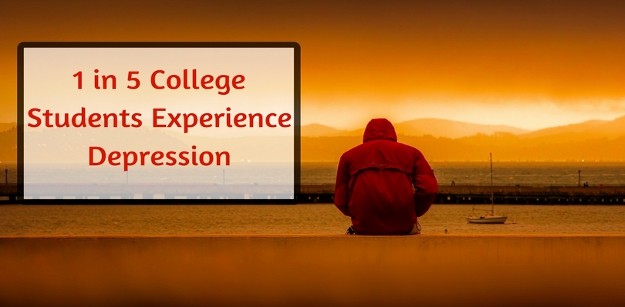You may think that going to college is one of those great experiences that helps to shape who you are while setting you up for future success. A mix of career opportunity and intellectual ferment abound while freedom to find one’s true self presents almost limitless possibilities.

While this may be true for many people, there is also an emerging mental health crisis unfolding as research suggests an alarming number of college students suffer from depression or anxiety.
Let’s have a look at why this may be.
According to a report from the Centre for Collegiate Mental Health, depression and anxiety are the top reasons for students visiting counsellors.
If you couple this with recent research coming from the American College Health Association that shows nearly 1 in 5 university students experience depression and anxiety, you can see a problem emerging.
Let’s look at some of the factors at play here.
Social Media – the virtual world
The ever-growing use, and reliance, on social media technologies is recognised as one the leading factors contributing to a sense of isolation and impaired social interaction.
Many students are living their lives in a virtual way, with their time spent on social media often competing with their day-to-day real world responsibilities.
Additionally, reports of college students being victims of cyber bullying in high school has increased dramatically, almost by 50% in the past ten years. This impact can then flow on to university, as the trend would only be amplified there.
Mobile phone addiction
Several studies point to mobile phone addiction as being associated with poor sleep patterns.
Take this example, as published in the journal of Cyberpsychology, Behavior, and Social Networking, where almost 50% of college respondents students indicated they woke up to answer text messages throughout the night. The study also found that the more people use technology during sleeping hours, the higher their chances of getting depression and experiencing poor sleep.
What about drugs?
Western nations are in the midst of what medical authorities call an ‘opioid epidemic’ with a record numbers of accidental death and overdose due in large part by legally prescribed medications.
Additionally, students may request such drugs as Ritalin and Adderall, with reports published by the National Institute of Mental Health indicating their use has dramatically increased in recent times.
It is common knowledge that the side effects of taking Ritalin and Adderall commonly include depression and anxiety, not to mention the longer term taking of these drugs leading to harmful addiction.
A vicious circle
Reports are emerging of depression leading to other health concerns, such as lower back pain.
This article provides a thorough summary of the research on how people experiencing depression tend to be less physically active, leading to musculoskeletal conditions such as back pain. The link here seems to be that because someone is depressed, they may stop going out, stop exercising, stop playing sports and therefore their body may tighten up, leading to health issues such as back pain.
Other stress factors
Coupled with ‘newer’ stress factors such as cyber bullying and mobile addiction are the more traditional stresses experienced during college years. These commonly include homesickness, loneliness, workload stress, financial and/or debt stress and separation anxiety. All of these factors combined can lead to the amplification of depression and anxiety feelings.
Conclusion
So what do we do to tackle the rise of anxiety and depression on college campus?
The answer is a trickly one, and no single solution appears to offer definitive help. The following points attempt to offer solutions to the issues high-lighted in this post:
- Help lines, that are usually staffed 24/7, may be off some assistance
- On campus mental health services can help
- Be aware of those around you and don’t be afraid to ask if someone is ok, as in many cases, depression is a hidden challenge
- The key is recognising those who may be at highest risk, or being aware of changes in people around you
- Make time to enjoy the real world around you, such as going for a walk in the park, speaking to friends and family and doing outdoor activities that make you happy
Be aware that while all that time spent on your phone and other devices may be fun, it is rewiring the reward centre in your brain and thus setting up a new bad habit, one that may take some time to get out of.